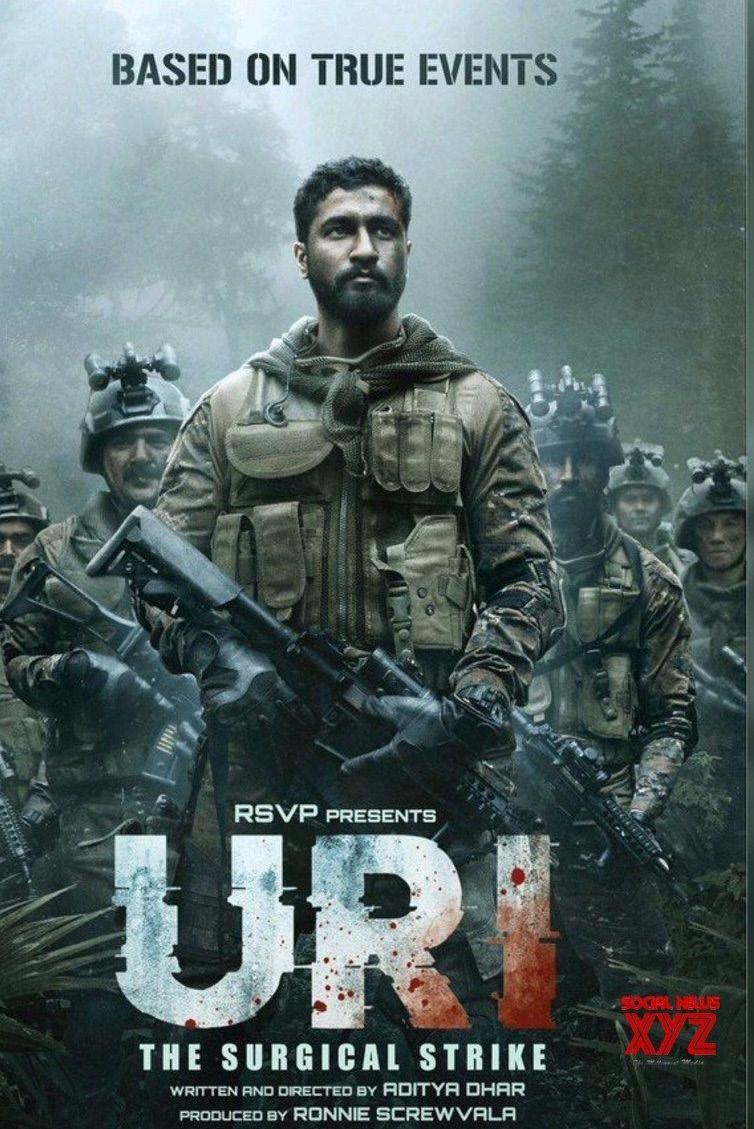
6 minute read
PLAYING THE MARKET
from 2019-01 Melbourne
by Indian Link
These are soldiers who have lost loved ones in terror attacks, and their blood boils.
Machiavellian stockbroker is everything that Harshad Mehta would have wanted written and performed part, meaty witty and wicked. He chews into it exposing a sacred hunger that I didn’t notice in his
Uri brings the blood of cross-border tension to a boil but avoids a spill-over. There is a rush of patriotic pride in the product - and why should there not be? - but it is reined-in, curbed and never allowed to spill over in a gush of irrepressible jingoism. If you want to see soldiers dancing around a bonfire singing about how much they love their country and how much miss their loved ones, then you've got the wrong war film.
BY mATT KeAN
Yes, these soldiers love their country. But family comes first. And when Vihaan's brother-in-law (Mohit Raina, making a striking big-screen debut) is killed in a vivid recreation of that reallife murderous attack at the Uri army base, Vihaan channels his personal loss to seek revenge on behalf of the country. It may not be the most patriotic of purposes. But it gives a certain disingenuous credibility to the mission.
Australia is a country of great diversity. You can see it in the faces of the people that you work with. You can see it in the restaurants that line the main streets of our towns. And you can see it in the variety of religious and cultural events celebrated around the country: Chinese New Year, Diwali, Hanukkah, Ramadan and Christmas to name a few.
All through its roomy yet tightlywound running-time Uri confidently gives us people and situations from that golden chapter in BJP's existence when India voluntarily forefeited the politics of pacifism to take on the enemy headlong.
However, the treatment of the Aboriginal peoples in this country stands as a chilling reminder that tolerance has not always been embraced. The Cronulla riots similarly reminds us how quickly what we have achieved can be put at risk.
him - a very dangerous ambition to have. And who knows this better than Rizwan’s wife Chitrangda Singh, who in a role severely conscripted by the plot’s bristling sinewiness, manages to find her redemptive moment in the grand finale.
of us who have resigned ourselves to substandard VFX in our cinema.
the mentor and the protegee together.
A flourishing society also requires more than just freedom of speech; it requires security, stability, a just legal system and a vibrant economy.
Saif and the very fine and confident debutant Rohan Mehra just don’t have enough scenes together. In fact Rohan builds a better bond with Saif’s screenwife Chitrangda Singh in just one scene where the teary-eyed protegee tells his mentor’s wife that sometimes you just need to give the one you love a tight slap. The written word seldom gets to be conveyed with such unvarnished directness in commercial Hindi cinema where everyone either talks florid or over-casual.
Uri is shot with astounding finesse by cinematographer Mitesh Mirchandani. Every frame is a thoughtful recreation of the moment in time when in 2016, Indian soldiers pushed their way into Pakistan-occupied Kashmir to seek revenge. There is no pitching for effect. The drama and the fury flow organically.
That is why freedom of speech is not absolute. In this country, it is criminal to disclose secrets which risk the lives of Australian soldiers. It is likewise a crime for a corporate executive to disclose market sensitive information to his mates. The law protects us from slander and protects privileged comments made to our lawyers.
In Baazaar the emotions are tightly reined-in as caustic vitriolic conversations are let loose with not a care about who’s eavesdropping.
Harshad Mehta? How could you forget the podgy stockbroker who made thousands of Indians rich overnight and then it all ended in a financial mess in no time at all?
STARRING: Vicky Kaushal, Mohit Raina, Paresh Rawal, Yami Gautam
DIRECTOR: Aditya Dhar fications with the unrehearsed cuteness of tycoon, who has long ceased to be cute to everyone, including his own wife and children.
HHHHH
Saif Ali Khan’s Shakun Kothari’s destiny run on the same lines. Except that Saif as the wily ruthless
Wars often rage within the soldiers' hearts, specially when they belong to
When debutant Rohan Mehra enters the plot as Rizwan there is no Shakun Kothari around. We know Rizwan idolizes Shakun and wants to be like army families. In one of this significant war film's highpoints, Major Vihaan Singh Shergill, played by the selfeffacing Vicky Kaushal, gathers his troop together somewhere in Kashmir before striking surgically in the country next door (okay, Pakistan. There. I said it).
The narrative is stylish and the political figures, from a dapper Narendra Modi (played with a refreshing absence of mimicry by Rajit Kapoor) to a droll Rakesh Bedi (playing a belching Pakistani politician), are all people whom we instantly recognise, not only by the way they look and talk but by their propensity to push the narrative into top gear without toppling the narrative into an excessively zealous jingoism.
The proposed amendments to the Racial Discrimination Act were put forward on the basis that the current wording of Section 18C inappropriately constrains our freedom of speech.

There is no redemption for Shakun. He is showman a ball of fire hurling down an abyss, and enjoying every moment of it. The film takes great pride in being clued into the inside workings of the stock market. Yet it never lets the tone of know-all self-congratulation come in the way of telling us the story of ‘When Shakun Met Rohan’.
That section makes it unlawful to do an act in public which “is reasonably likely… to offend, insult, humiliate or intimidate another person or a group of people” if “the act is done because of the race, colour or national or ethnic origin of the other person”.
My quibble with the rivetting script (Nikhil Advani, Parvez Sheikh, Aseem Arora) is that it takes its time in bringing
While the actors playing Indian soldiers are uniformly (pun intended) credible, the film's technical polish may come as bit of a surprise to those
Revenge served cold is said to be effective. Writer-director Aditya Dhar serves it up piping hot. The locations and the gunfire exchanges are perhaps the best we've seen in Indian cinema. The sound-design and background score capture the pain of lost human lives without bleeding out a banshee of road signs for our emotional responses. The tone of narration avoids overstatement. Dhar avoids the temptation of selfcongratulation. Barring a dialogue like Ghar mein ghus ke marunga which doesn't really belong to this film of graceful comeuppance, there is little chest-thumping here.
As a society, we recognise that these restrictions do not hurt our democracy or way of life. Indeed, we understand that they are necessary to maintain it. And laws against hate speech are no less necessary, because racism and bigotry tear at the heart of our social fabric.
My favourite line, and the one that says it all about Shakun Kothari, is the one in the run-down Gujarati bhojanalaiya. “You think I come here because I love the food? No, the food is terrible! But it helps me never forget where I came from.”
The brilliance of the line is never forgotten in a morality tale that never pushes its righteousness into our face. In fact I suspect the very assured debutant director Gauravv K. Chawla actually enjoys his grey protagonist’s amorality.
The performances add considerable weight to the drama. While Kaushal surrenders to his character's conflicts without intellectualising them, I must make a special mention of the underused Kirti Kulhari who plays a small enigmatic part as the daughter of a disgraced army officer waiting to redeem her family pride - almost like the war genre in Indian cinema that had gone from Chetan Anand's Haqeeqat and J.P. Dutta's Border to Dutta's Paltan
Racism and bigotry leave people feeling exiled in their own home. They do not improve the quality of public debate nor do they assist the wise completion of a ballot paper. They are insidious because they attack a person because of their identity; their heritage. They imply that a person is inferior because of who they are. They are hurtful, divisive and can lead to individuals and entire communities feeling unwanted, unvalued and second-class.
Saif’s blustering warmth keeps Shakun Kothari from falling apart even when the stakes are heavily weighed against him.
While some of the other supporting performances just don’t match upthe ever-brilliant Manish Choudhary struggles in an underwritten role; Radhika Apte as Rizwan’s go-getting colleague makes space for herself. In a way she tokenizes the film’s morality. In today’s times you have to push your way into attention.
Uri is a work of many achievements. But to me, a film about national pride without a single shot of the Indian flag is the biggest miracle since the invention of the motion-picture camera. This is a glorious beginning to 2019. And if patriotism is the flavour of the year, bring it on, provided it's not about Pakibashing. Just getting even.
As a society, we recognise that restrictions on free speech do not hurt our democracy or way of life. Indeed, we understand they are necessary to maintain it. And
Subhash K. Jha
Subhash K. Jha









